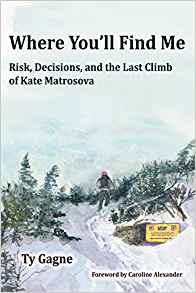
Where You’ll Find Me
By: Ty Gagne
Book review by: Bryn Clark
Wilderness adventure (and misadventure) narratives are a dime a dozen. Since the massive success Into Thin Air and its step-sibling Into the Wild it seems to me that a new saga is published each week. Many of them wouldn’t be of great interest to anyone outside the outdoor industry. But Where You’ll Find Me: Risk, Decisions, and the Last Climb of Kate Matrosova by Ty Gagne breaks from this camp.
Kate Matrosova was an exceptionally capable and experienced mountain climber who went missing in the northern Presidential Range of New Hampshire’s White Mountains in February of 2015. What followed was a rescue effort that involved dozens of experienced emergency responders, a Black Hawk helicopter and a GPS-tracking Cessna. But none of these efforts were enough to save her.
In Where You’ll Find Me, Gagne chronicles the decisions that led to Kate’s misadventure and the rescue efforts that followed. Gagne’s appraisal of Matrosova’s last climb is thorough and insightful. At the same time, the narrative is not weighed down with unnecessary detail. Even though I knew Matrosova’s story going into the book, I was still gripped by the struggle and tension of the narrative.
Gagne’s take on the story is unique in his perspective and approach. Gagne is, by trade, a risk management consultant. As he tells Matrosova’s story, he outlines numerous factors and tools in the risk management process that show itself in the story. In doing so, Gagne extracts lessons from the processes that are at play not only in this scenario but also show themselves in many day-to-day activities and lines of work. You don’t need to be planning a winter climb up Washington to learn from this book.
That said, one of the things Gagne does very well is withheld judgment. This happens on two levels: he neither accuses nor defends Matrosova’s actions. Although Gagne alludes to the fact that, in tragedies such as this, criticism and accusations fly, Gagne never gives ear to these voices let alone adds any of his own. His depiction of what took place is gentle and respectful while at the same time not withholding details or trying to pretend like there weren’t missteps. In doing so, Gagne allows us to engage with the story on its level and to draw personal lessons accordingly.
Kate’s Matrosova’s story is a sad one. And there are many like it. But, when guided by Gagne’s insight and professional wisdom, there are lessons all of us can learn from one climber’s journey into the mountains. The book is worth it’s time for anyone who hopes to learn, not only from others’, but also from their own mistakes.
